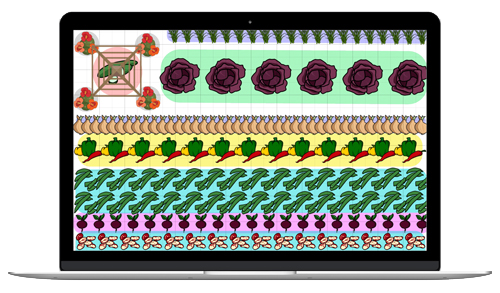
Planting, Growing, and Harvesting Raspberries
The Almanac Garden Planner - Use It Free for 7 Days!
Plan your 2025 garden with our award-winning Garden Planner.
There are many, many raspberry varieties available today—and each one is unique! Ask your local garden center or cooperative extension service which raspberry varieties are best suited for your area. Here are a few to get you started:
- ‘Canby’: red berries; summer-bearing; nearly thornless; recommended for New England, Upper Great Lakes, and Northwest
- ‘Heritage’: red berries; ever-bearing; recommended for the Mid-Atlantic and Ohio Valley
- ‘Plainsman’: red berries; ever-bearing; does well in higher altitudes (the Rockies and High Plains)
- ‘Fallgold’: yellow berries; ever-bearing; recommended for the Upper Midwest and Canada
- ‘Double Gold’: yellow berries tinged with peach; ever-bearing; better for warmer areas, as the fall crop can be quite late
- ‘Royalty’: purple berries; summer-bearing; better for warmer areas
- ‘Jewel’: black berries; summer-bearing; disease-resistant, and great for warmer areas
- ‘Black Hawk’: black berries; summer-bearing; heat and drought tolerant
Tired of raspberries? Try your hand at growing blackberries, blueberries, or strawberries instead!
Cooking Notes
Fresh raspberries are wonderful in cereals or paired with a dollop of Greek-style yogurt or cream and an indulgent drizzle of maple syrup.
Freeze excess berries to use in smoothies and desserts, or make them into raspberry jam.
If the fruit is to be made into preserves, it should be done with fruit that’s as fresh as possible.
ADVERTISEMENT
Hi Everyone,
We have a quite a big raspberry field and have always had problems with the pickers. Now, we are planning to build a harvester, which uses the power of the air to harvest the ripe raspberries.
The only issue we have in the planning process is that we dont really want to test different sized of air blowers, you know, the price of it isnt really easy to pay...
What do you think, with what size of air blower should we go first? We dont want to buy a little one, for the fear of being to small, also dont really wanna go with too big, as it is expensive and may be waste of money and sources.
Thank you in advance!
Hello,
This spring will be the third year for my raspberry plant. It's summer-bearing and produced heavily last summer. It will outgrow the garden this year... I'm thinking about digging up the entire plant, dividing it into several plants, and relocating them to another area with more space. If I do, and keep the new canes from last summer, will they produce fruit this spring? Or will the trauma of the move prevent fruiting this year regardless of the existing canes?
Thank you
You are right to wonder about the fruiting performance of newly transplanted canes. It is likely they will put most of their energy into getting established (root production). You may see a bit of fruiting, but be prepared for that not being the case. Perhaps you could transplant the older canes this spring, leaving the two-year canes to fruit, then move then next spring … just a thought!
Hi. I have a lot of pale pale apricot raspberries that are still ripening. We will have three nights in the 20's this week, and I am wondering if I cut those branches and bring them inside in a vase, will they finish ripening inside? Or, will they survive the freeze? I live in South Lake Tahoe
Hmm. Good question! I’m not a botanist, but here are my thoughts. Raspberries do not ripen once picked. If the berries were still attached on a branch, but that branch did not have access to nutrients etc. from the main plant, it is unclear whether they would indeed continue to ripen. Would the branch have enough of what the berries needed to mature? It would be a good experiment! You might try a few branches, but otherwise, you can try covering your bushes with garden frost blankets overnight, and perhaps protect the base with a thick layer of straw. Good luck!
If the canes don't produce till 2 years old and you save the one year old canes, why would you mow them all down at the end of the season??
Hi Brian,
If you want to have two crops (a light crop in early June and an heavier crop in September), leave 1st-year canes unpruned. For a fall crop only, mow all canes down to 2 to 3 inches after the fall harvest.
I live in an area that gets as hot as 95F now a days and as cold as freezing with a little snow in the winter. I want to know if it is OK to plant Raspberry plants in the fall, like October.
Lesley
It sounds like you are in a USDA Plant Hardiness Zone that is more southern. To learn about USDA hardiness zones, see: http://www.almanac.com/content/plant-hardiness-zones
Although in general raspberries do best in cooler climes, their growth slowing in high summer heat, there are some that offer heat tolerance and have a less of a chilling requirement in winter. Check with your local nursery about cultivars appropriate for your area. Heat-tolerant cultivars include ‘Bababerry’, ‘Dorman Red’, and ‘Oregon 1030’.
Most sources say that early spring (when the plants are still dormant), is the best time to plant raspberries. However, you can plant them in fall (again, when plants are dormant) before the ground freezes, or in the South, in late winter.
We have a thornless raspberry variety. Do they need cutting in fall to the ground? I am disappointed that they are not producing. We have not cut them so they are real tall around 6-7 feet tall.













